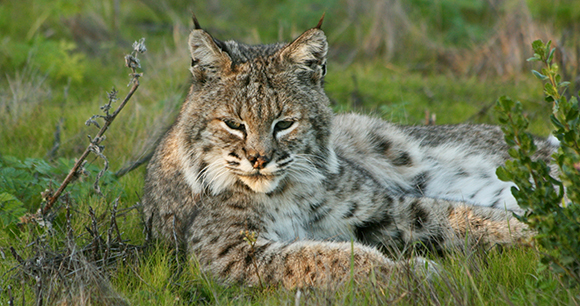
Salinas, CA—The California Superior Court ruled last week that Monterey County’s renewal of its contract with the US Department of Agriculture’s Wildlife Services program to kill predators and other native wildlife violated the California Environmental Quality Act (CEQA) and voided the county’s 2016 work plan. The court’s decision was in response to a lawsuit filed last summer by animal protection and conservation organizations.
According to the court, Monterey County’s renewal of its contract with Wildlife Services violates CEQA because the county failed to analyze environmental impacts and wrongfully claimed an exemption from the Act. Specifically, the court found that, in approving the 2016 work plan, the county’s actions constituted an abuse of discretion because there was no initial study, negative declaration, or environmental impact report completed.
“It is appalling that Wildlife Services, a little known federal program, uses taxpayer dollars to slaughter millions of wild animals annually,” explained Tara Zuardo, a wildlife attorney with the Animal Welfare Institute. “We applaud the court in this case for calling out Monterey County for violating state law and recognizing the significant environmental impact of Wildlife Service’s unnecessary and inhumane slaughter of wildlife in the county.”
“This is a decisive victory for California’s wildlife and for science as it sends a clear message to USDA Wildlife Services and to entities contracting with them that they must look at the impacts of killing thousands of animals to both target and non-target animals as well as to the environment,” said Camilla Fox, founder and executive director of Project Coyote.
Monterey County’s previous contract authorized Wildlife Services to kill hundreds of coyotes, as well as bobcats, mountain lions and other animals every year without fully assessing the ecological damage or considering alternatives. For example, from June 2014 to June 2015, Wildlife Services killed 105 coyotes, three mountain lions, and two bobcats in the county. Over the past six years, Wildlife Services has killed more than 3,500 animals in Monterey County using traps, snares and firearms.
“This decision is a major victory for Monterey County’s coyotes, foxes and other wildlife,” said Collette Adkins, an attorney and biologist at the Center for Biological Diversity. “All the latest science shows predator control is expensive, ineffective and inhumane. We hope the court’s decision spurs the county to realize that business-as-usual wildlife killing is no longer acceptable.”
“We are pleased with the court’s decision and willingness to enforce this important environmental statute,” said Katherine Henderson, the lead attorney representing the conservation organizations.
“Wildlife Services should be under close scrutiny for its track record of indiscriminate killing and subjecting countless animals to painful deaths,” says Animal Legal Defense Fund executive director Stephen Wells. “The individual coyotes, foxes, bobcats and others killed annually by Wildlife Services are integral components of the environment, and the government cannot recklessly kill these species without carefully assessing the potential ecological consequences of their deaths.”
A Monterey County resident joined with Animal Legal Defense Fund, the Animal Welfare Institute, the Center for Biological Diversity, the Natural Resources Defense Council, Project Coyote and the Mountain Lion Foundation to file the lawsuit that led to this victory. The conservationists were represented by Katherine Henderson, Christopher Mays and Mary Procaccio-Flowers of the law firm of Wilson Sonsini Goodrich & Rosati.
Background
Last year Wildlife Services reported that it killed 1.6 million native animals nationwide—including 3,893 coyotes, 142 foxes, 83 black bears, 18 bobcats and thousands of other creatures in California. Nontarget animals—including family dogs and protected wildlife such as wolves, Pacific fisher, and eagles—are also at risk from Wildlife Services’ indiscriminate methods.
Peer-reviewed research shows that such reckless slaughter of animals—particularly predators—results in broad ecological destruction and loss of biodiversity. The program’s controversial and indiscriminate killing methods have come under increased scrutiny from scientists, the public, and government officials.
Amey Owen, (202) 446-2128, [email protected]
About the Animal Welfare Institute
The Animal Welfare Institute is a nonprofit charitable organization founded in 1951 and dedicated to reducing animal suffering caused by people. AWI engages policymakers, scientists, industry, and the public to achieve better treatment of animals everywhere—in the laboratory, on the farm, in commerce, at home, and in the wild. For more information, visit awionline.org.
About the Animal Legal Defense Fund
The Animal Legal Defense Fund was founded in 1979 to protect the lives and advance the interests of animals through the legal system. To accomplish this mission, the Animal Legal Defense Fund files high-impact lawsuits to protect animals from harm; provides free legal assistance and training to prosecutors to assure that animal abusers are punished for their crimes; supports tough animal protection legislation and fights harmful legislation; and provides resources and opportunities to law students and professionals to advance the emerging field of animal law. For more information, please visit aldf.org.
About the Center for Biological Diversity
The Center for Biological Diversity is a national, nonprofit conservation organization with more than 1.1 million members and online activists dedicated to the protection of endangered species and wild places: biologicaldiversity.org
About Project Coyote
Project Coyote, a national nonprofit organization headquartered in Northern California, is a North American coalition of wildlife educators, scientists, ranchers, and community leaders promoting coexistence between people and wildlife, and compassionate conservation through education, science, and advocacy. For more information, visit ProjectCoyote.org
About the Natural Resources Defense Council
The Natural Resources Defense Council (NRDC) is an international nonprofit environmental organization with more than 2 million members and online activists. Since 1970, our lawyers, scientists, and other environmental specialists have worked to protect the world's natural resources, public health, and the environment. NRDC has offices in New York City, Washington, DC, Los Angeles, San Francisco, Chicago, Bozeman, Montana, and Beijing. Visit us at www.nrdc.org and follow us on Twitter @NRDC.
About the Mountain Lion Foundation
For 30 years, the Mountain Lion Foundation has worked with member volunteers and activists to further wildlife policies that seek to protect mountain lions, people and domestic animals without resorting to lethal measures. For more information, visit mountainlion.org.